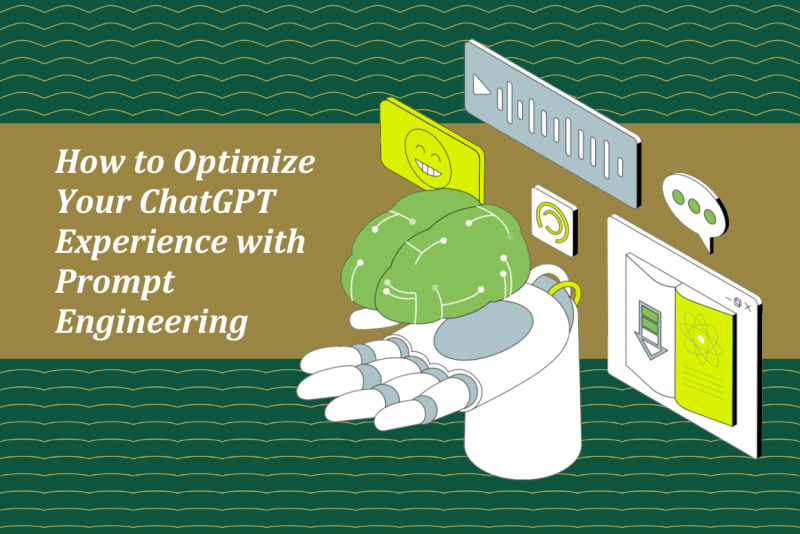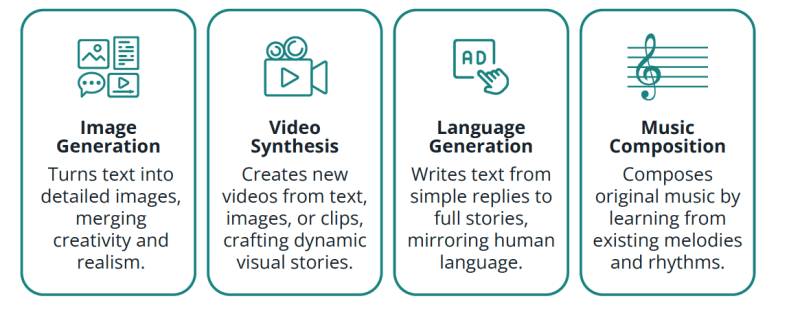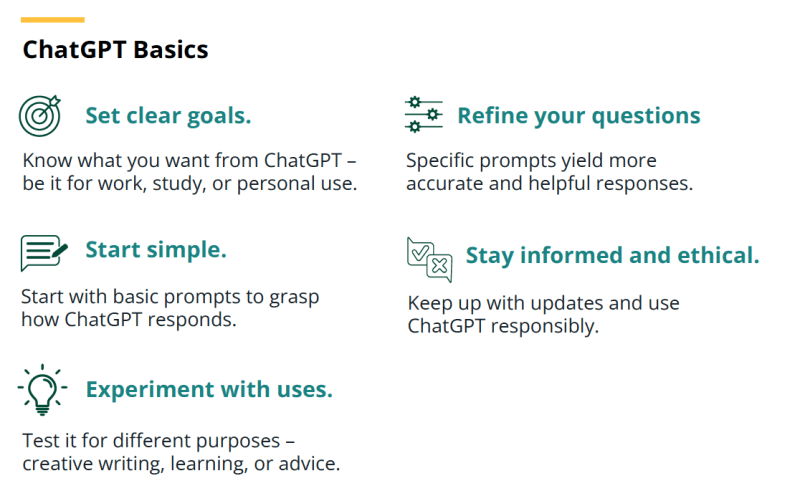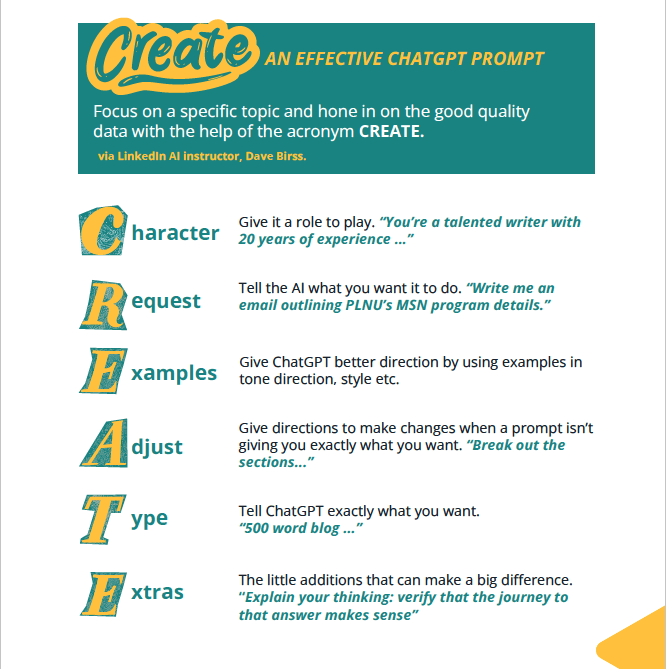
ChatGPT, by OpenAI, is a groundbreaking AI chatbot revolutionizing digital communication. It's an intelligent tool capable of understanding and generating human-like text, widely recognized for its adaptability and user-friendly interface.
How does Generative AI work?
Generative AI can create new content — be it images, text, videos, or music — based on the patterns it learns from existing data.
Unlike traditional AI that focuses on understanding or analyzing data, generative AI takes a step further by producing original creations. It does this by analyzing vast amounts of data to understand styles, structures, and nuances, and then applies this understanding to generate new, unique outputs that didn't exist before. This makes it a powerful tool for creativity and innovation, allowing for the creation of things ranging from artworks and literature to realistic simulations and beyond.
Some key features of Generative AI include:

Generative AI Types
Generative AI can be broken down into four different sub-categories:

ChatGPT Basics
1. Set clear goals
Know what you want from ChatGPT — be it for work, study, or personal use.
2. Start simple
Start with basic prompts to grasp how ChatGPT responds.
3. Refine your questions
Specific prompts yield more accurate and helpful responses.
4. Experiment with uses
Test it for different purposes — creative writing, learning, or advice.
5. Stay informed and ethical
Keep up with updates and use ChatGPT responsibly.

The importance of the prompt
Prompt engineering is a skill that blends art and science, using strategic language to get the most accurate and creative outputs from the AI.
This goes beyond basic questioning. It involves crafting prompts that guide the AI to provide optimal responses, requiring an understanding of how language models work and how they respond to different inputs.
What is a prompt?
A prompt is an input provided by the user consisting of text or instructions, which the AI interprets and then responds to accordingly.
How to craft a good ChatGPT prompt
Via Rachel Woods, data scientist and founder of The AI Exchange
1. Create context
Tell it what you want it to act as. This helps ChatGPT role-play and gives more context for your task.
Example: “You’re an expert marketer”
2. Be specific
Provide details for a more concrete task at hand.
Example: “You will be responsible for writing engaging Instagram captions for PLNU. You write in our brand voice which is casual, friendly, and educated.”
3. Give clear instructions
It is important to make sure that your instructions are clear for what you expect in return.
“My first request is I need a caption for a photo of a student praying in a chapel. Tie in a scripture about prayer and end with #WorshipWednesday.”
4. Be simple and concise
By keeping your language simple and concise, you will yield a better output.
💡Pro Tip: If you find yourself being wordy, you can even ask the AI model to rewrite your prompt to be more concise.
CREATE an effective prompt with ChatGPT
Focus on a specific topic and hone in on the good quality data with the help of the acronym CREATE.

Prompt engineering best practices
Generative AI thrives on detailed and specific instructions to produce the intended output. Adhering to these guidelines ensures the development of more personalized, contextually accurate applications.
1. Always use the most current model:
In 2024, ChatGPT4 is most advanced (paid subscription required)
2. Instruction placement and separation:
Begin the prompt with clear instructions and use separators like ### or """ to differentiate between instructions and context.
3. Provide examples:
Show the desired output format by giving examples. This makes it easier to understand and follow specific format requirements, which are crucial for tasks like structured data output.
4. Detailed and descriptive requests:
Be as specific, descriptive, and detailed as possible about the desired context, outcome, length, format, and style.
5. Use positive instructions:
Instead of stating what not to do, focus on what the AI should do. This is effective in guiding the AI towards the desired outcome.
6. Zero-shot to few-shot progression:
Start with zero-shot prompts (no examples), then move to few-shot prompts (a couple of examples), and if needed, fine-tune more. This helps gradually train the model for specific tasks or outputs.
7. Eliminate Ambiguity
Avoid fluffy and imprecise descriptions in your prompts. Be concise and clear in what you are asking for, using exact word counts or specific sentence structures when necessary.
______
Who are you called to be?
Pursue your purpose at PLNU.
______
AI Limitations
AI has limitations. This is why AI will never fully be able to replace humans. Here are just a few challenges and limitations you’ll face as you begin prompt engineering:
- Computational Costs: New content generation demands significant computing resources and time.
- GPU Constraints: GPUs, crucial for parallel processing in AI, can limit data handling and processing speed if insufficient.
- Algorithmic Hallucination: AI might generate false information when overfitting small or biased datasets. It's vital to use AI as an input source, not a truth source.
- Staleness: AI models, trained on specific data, may become outdated and struggle in rapidly changing contexts.
- Restrictiveness: Many AIs are limited to text or image data, hindering their ability to perform basic tasks or calculations.
- Interpretability Issues: The 'black box' nature of many AIs makes understanding their outputs difficult, complicating error diagnosis and model improvement.
- Token Limitations: Tokens, the units AI processes at a time, restrict the amount of text the system can handle, impacting the training and problem-solving scope.
- State Memory: AI's capacity to remember past inputs is crucial for contextually relevant outputs in tasks like conversation or art generation.
- Data Quality and Availability: High-quality, large-scale data is essential. Poor or biased data leads to flawed outputs.
- Ethical Concerns: Risks include AI-generated fake content and its use for disinformation or creating deepfakes.
AI Ethical Dilemmas
As AI becomes a mainstay in the workplace, it's crucial to address the main ethical dilemmas the business world faces with the integration of AI.
5 Key Dilemmas
1. Bias and Discrimination
AI can reflect and amplify biases from its training data, leading to unfairness in areas like hiring or law enforcement. The challenge is to design AI that is fair and unbiased.
2. Privacy and Surveillance
AI's ability to analyze vast data can invade privacy. Businesses must balance data use with individual privacy rights.
3. Accountability and Transparency
AI's complex decision-making can be a "black box," raising issues about explainability and auditing. Clear accountability for AI decisions is crucial.
4. Job Displacement
AI and automation might displace workers, raising concerns about job market shifts and the equitable distribution of AI benefits.There are also ongoing concerns about intellectual property and AI's usage of copyrighted material.
5. AI Autonomy and Human Control
As AI advances, the need for human oversight remains critical to ensure responsible operation and clear responsibility for AI actions.

Preparing for an AI-Driven Future at PLNU
As we move further into the age of AI, it’s clear that this technology is here to stay. Embracing AI ethically and effectively is not just a skill for the future; it’s a necessity for today. At Point Loma, we are committed to integrating cutting-edge technology with a foundation of ethical principles, preparing our students to excel in an AI-driven world.
If you're looking to earn your degree, choosing a college that values and integrates these technologies responsibly is crucial. PLNU offers a forward-thinking education that equips you with the knowledge and skills needed to thrive in an ever-evolving landscape.
Discover how PLNU can help you unlock your potential and succeed in a world increasingly shaped by AI. Explore our programs and take the first step toward your future today.
